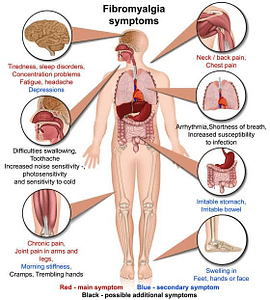 Can CBD topicals ease fibromyalgia pain safely? It definitely has potential.
Can CBD topicals ease fibromyalgia pain safely? It definitely has potential.
Fibromyalgia continues to flummox patients and physicians alike. It’s not clear why some people get fibromyalgia and others don’t. Doctors don’t know what causes it and think there may be multiple factors involved.
According to the Mayo Clinic, what doctors do know is this: “Fibromyalgia is a disorder characterized by widespread musculoskeletal pain accompanied by fatigue, sleep, memory and mood issues. Researchers believe that fibromyalgia amplifies painful sensations by affecting the way your brain and spinal cord process painful and nonpainful signals.”
CBD topicals and fibromyalgia pain
This musculoskeletal pain is where CBD topicals can come in. CBD, or cannabidiol, is one of about 100 cannabinoids in cannabis. Studies show that CBD may help relieve the pain and inflammation of fibromyalgia. Here’s the best part, CBD topicals aren’t addictive and have few if any side effects.
Kevin Boehnke, PhD, a research investigator in the Department of Anesthesiology and the Chronic Pain and Fatigue Research Center, surveyed people with fibromyalgia about their use of CBD for treatment of chronic pain. With a focus on 878 people with fibromyalgia, the team found that more than 70% of participants who substituted CBD for opioids or other pain medications reported that they either decreased use or stopped taking opioids and other pain medications altogether.
How could CBD ease fibromyalgia pain?
Dr. Ethan Russo, a prominent neurologist and pharmacologist who has dedicated much of his professional career to studying cannabis and the endocannabinoid system, theorized that fibromyalgia could be related to Clinical Endocannabinoid Deficiency.
As I’ve stated before, we all have an endocannabinoid system (ECS) already in place in our brains and throughout our bodies. Russo’s thought is that a CBD deficiency may be the underlying culprit in this chronic condition. By introducing CBD topically, it may help reduce the deficiency. The CB1 and CB2 receptors in the ECS communicate with the applied CBD, which can help reduce pain.
The ECS can be broken down into three components: endocannabinoids, receptors and enzymes. Here is what each does.
Endocannabinoids are molecules produced by your body. Two key endocannabinoids, anandamide and 2-arachidonoylglyerol, are produced on demand to keep your internal functions operating smoothly.
Endocannabinoid receptors, CB1 and CB2, bind with cannabinoids to help regulate a deficiency. For instance, CB1 receptors found in the central nervous system may bind with a cannabinoid to relieve pain. CBD may attach to CB2 receptors or cause the body to produce natural cannabinoids to help reduce inflammation, which is a big factor in fibromyalgia.
Enzymes break down the endocannabinoids once their work is complete.
How do CBD and CB receptors interact?
To understand the effects of CBD let’s look at the relationship between the receptors and endocannabinoids.
Within the ECS, CB1 and CB2 receptors regulate appetite, mood, pain and other processes to maintain balance.
- CB1: primarily in the central nervous system, including parts of the brain and spinal cord.
- CB2: mainly in immune system tissues.
- Interestingly, both have been found in skin.
Our ECS is always on the lookout for imbalance. An imbalance causes the ECS to produce cannabinoids that interact with receptors. The chemical process that occurs targets and resolves the imbalance to restore homeostasis.
Sometimes, however, the receptors need a little help. That’s where CBD comes in. It’s a known anti-inflammatory, antibacterial, analgesic and antioxidant. For fibromyalgia, wounds, burns, arthritis, pain, sore muscles, etc., apply CBD topicals directly to the affected area. Your skin instantly absorbs all of the hemp-derived nutrients, allowing a quicker, more focused effect. Researchers believe that CBD doesn’t attach directly to the receptors. Instead, it activates them, which allows for many of the health benefits that people associate with CBD.
Are CBD topicals safe?
In a word, yes. As I mentioned before, topicals are not addictive and have few if any side effects. However, it affects everyone differently, and dosage is not yet regulated. Consult your doctor, do your research and know what you are getting. Before you do that, read Life after fibromyalgia, Carolyn’s journey to relieving fibromyalgia symptoms with CBD.
CBD seems to offer more hope for relief from the chronic and difficult symptoms than mainstream medications. Clearly, more study is necessary but there is potential here, and people are willing to forego evidence-based studies to relieve symptoms with a product that doesn’t have harmful or troublesome side effects.
